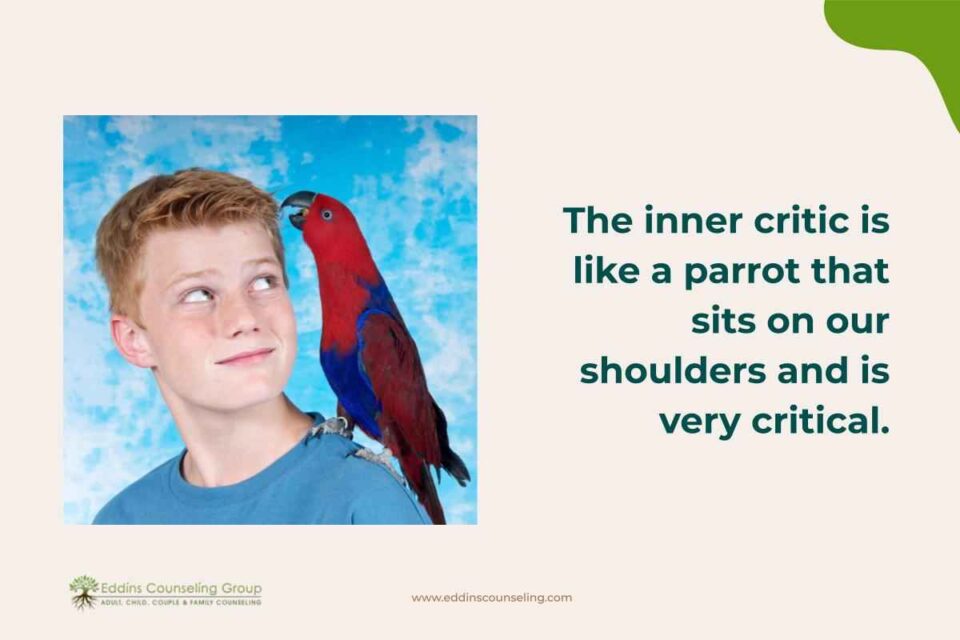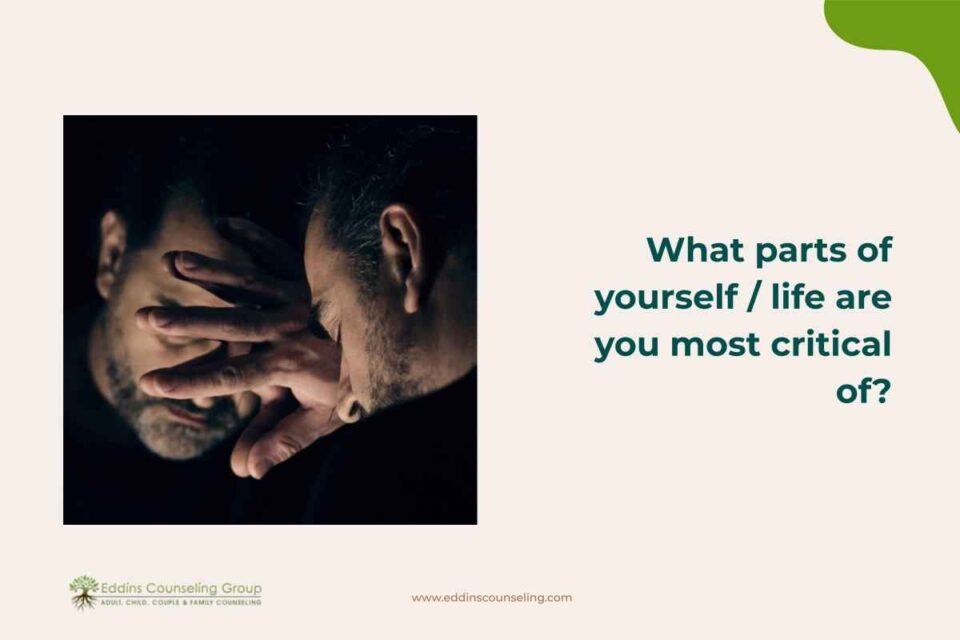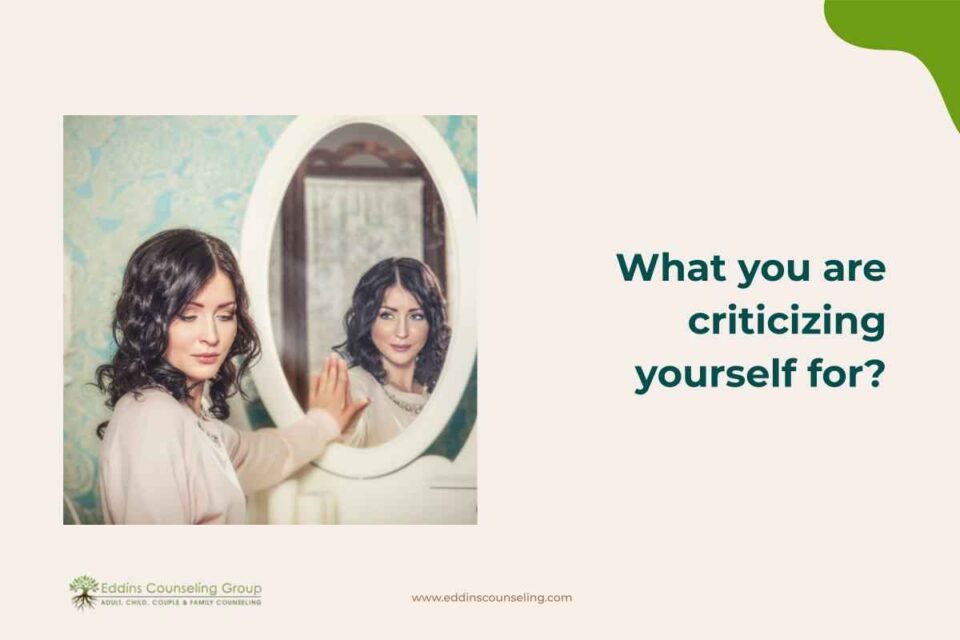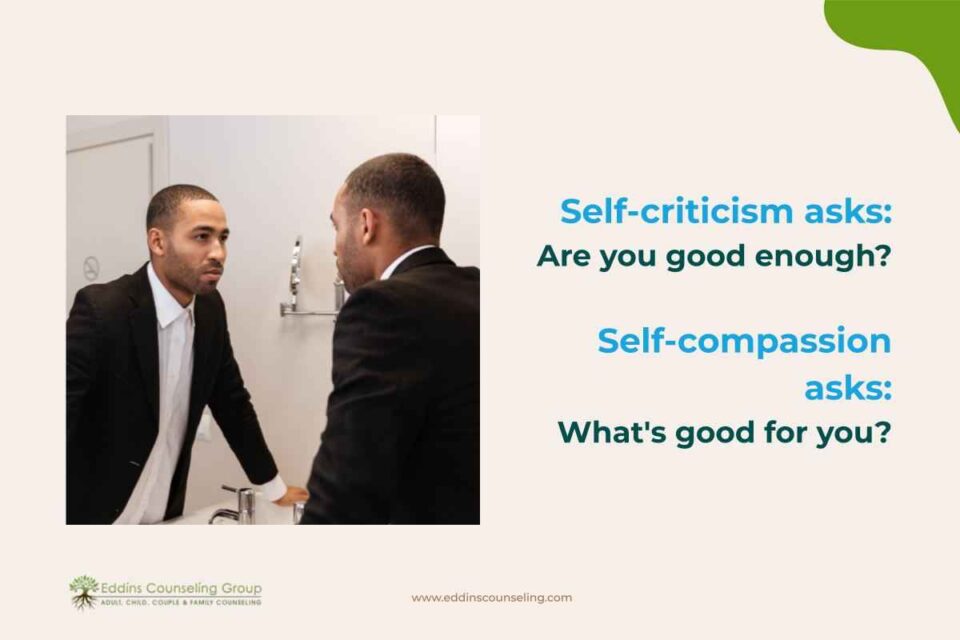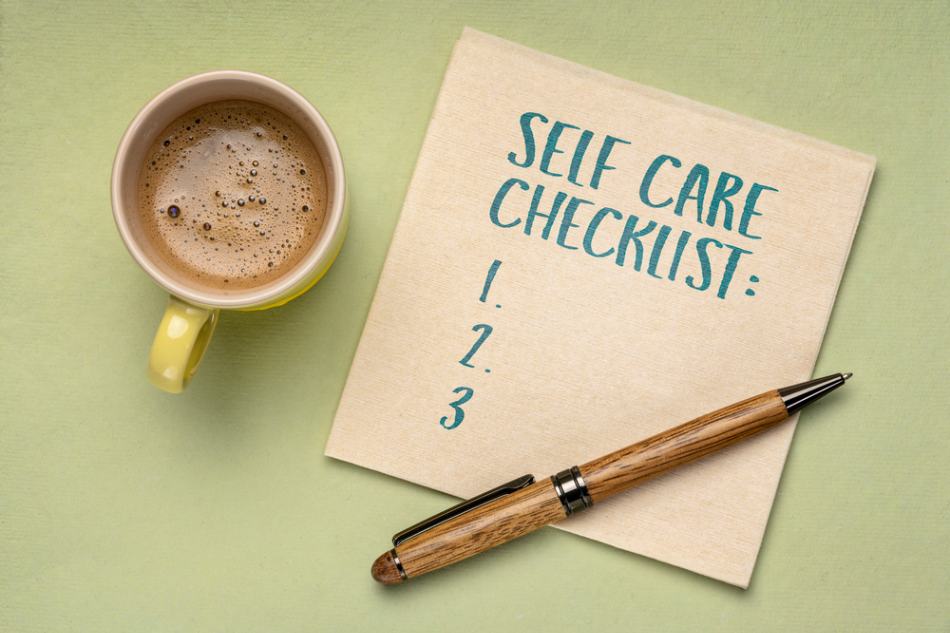November 12, 2020
Webinar: Combatting Your Inner Critic and Living a Life of Self-Compassion
Written by Rachel Eddins
Posted in Self Help / Personal Development, Webinars and with tags: self-compassion, self-esteem

Do you find yourself listening to this voice and feeling shame, self-loathing, and doubt?
We all possess an inner critic or “critical inner voice.” We experience this “voice” as a negative internal commentary on who we are and how we behave.
This wellness talk will focus on identifying, separating from, and acting against this destructive thought process and living your life with self-compassion.
Facilitated by Greta Bellinger, LCSW.
Watch a replay of the presentation here.
Learn more about our Self-Esteem Counseling Services.
Here is a transcript of the webinar:
My name is Greta Bellinger and I am a social worker by degree. I am very passionate about the topic of inner critic and self-compassion.
I spent many, many years in that negative space, that debilitating place where the inner critic was not helpful and I have learned over the years to develop a life of self-compassion.
At Eddins Counseling Group, I work with couples and families, and individuals and this is generally part of my work with them. The part of my work that I really enjoy is seeing people being set free from the inner critic and its’ harshness.
Objectives
- Defining the Inner Critic
- Identifying the Critic
- Developing Self-Compassion
- Practical Application
Our objectives tonight will be: defining the inner critic, identifying the inner critic, developing self-compassion, and then we’re going to take a look at some practical applications.
I am going to try to not talk too fast. My inner critic would say: “Slow down, you talk too fast when you get nervous.”
And there’s always a part of me before presentations where a little bit of my anxiety shows up, sometimes more than I care to like. And of course, because I do have an inner critic like the rest of you, when I was working on this presentation, the first thing it wanted to say was: “What business do you have doing your presentation on the inner critic?”
I politely shut my inner critic down and said: “I have a lot of experience with you”. So these will be our objectives and we want to define the inner critic.
Definition of Inner Critic
The psychological concept of the inner voice that demeans and judges us. It is:
- The voice in our head that constantly criticizes, belittles and judges.
- Also referred to as judger, saboteur, superego.
- A harsh voice – unloving
- Negative self-talker
- Relentless destructive chatter
It’s a voice in our head that constantly criticizes, belittles, and judges us. The inner critic is like a parrot that sits on our shoulders and is very critical.
When I work with children, I will have them draw their inner critic. If that’s something that you think would be helpful for you, I would invite you to do that.
It’s really interesting how children will draw cartoon characters or obscure figures that their inner critic looks like. So for you to decide, what does your inner critic look like?
It’s also referred to as a judger, a saboteur, and, as Freud’s work brings into the superego.
Typically our inner critic has a harsh voice, a very harsh tone, unloving, uninviting, lack of empathy and compassion, and very negative self-talk.
And again, like the parrot, this relentless destructive chatter.
The Psychology of The Inner Critic:
- Most psychologists agree the roots of our inner critic are in our childhood
- Freud said:
- We internalize external views of self- (parents, caregivers)
- Superego – cruel, unforgiving, punishes
- Deem ourselves as unworthy, and see the world having that same view
- Spend most of our psychological energy on inner warfare leaving little for our external world – family, friends
Most psychologists agree that the roots of our inner critic occur in our childhood.
Again, looking at Freud, we internalize our external view of self. The way our parents looked at us, the way our caregivers perceived us, as well as coaches, and teachers (those primary figures in our life that could be criticizing).
The superego is cruel, unforgiving, punish.
We begin to deem ourselves unworthy. We see the world as having that same view.
It’s hard for us to think that if other people, like your primary caregivers, have kind of this negative view or are critical of you, surely the whole entire world looks at you the same way.
What ends up happening is we end up spending most of our psychological energy on this inner warfare. Trying to battle between how the external and the internal align or don’t align.
And because we’re in this warfare, we have little energy left for the most meaningful parts of our lives which are our friends, our family, and relationships.

So this little girl, she’s adorable. This is before she realized that it is a hostile world out there. People criticize us. People drive us to be our best. And maybe they say things in a negative way to try to get us to achieve that.
She thinks: “I’m awesome. I’m the best. My mommy and daddy love me. Everyone’s here for me. They think I’m great.”
She doesn’t have that experience yet where someone’s criticized her or said something harsh, where she’s starting to internalize and think, what’s wrong with me?
Development
- Located in the survivor part of our brain that is tasked with physical survival – the fight, flight, freeze response.
- Originally had a function of safety – keeps us from danger
- Keeps us from making mistakes
- Can help motivate toward goals
- Involves the amygdala and limbic system which regulates our emotions
- As children, we internalize the external world around us and instead of placing responsibility/blame on critical parents, coaches, teachers, etc., we turn the criticism inward – information is simply too devastating to cope with
- What may be a survival mechanism in childhood can be a debilitating handicap in adulthood.
So this is the development of the inner critic.
It’s located in that survival part of our brain that’s tasked with physical survival. That place where we go into flight, fight, freeze response.
It involves the amygdala and the limbic system which regulates our emotions. It originally had the function of keeping us safe, keeping us from danger, keeping us from making mistakes, and helping us stay motivated toward our goals.
As children, we internalize the external world around us.
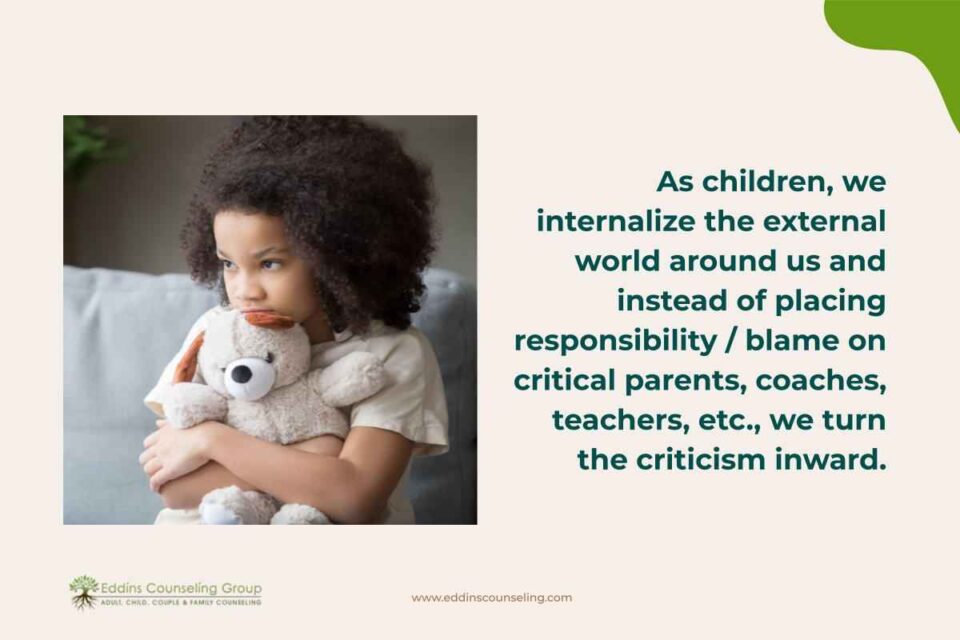
Instead of placing responsibility on our critical parents or coaches or teachers, we turn the criticism inward. We look to those people, such as our parents, grandparents, or primary caregivers as our source of survival, as our source of safety.
When that happens, we as children cannot put the responsibility on them for their behavior. And so we begin to internalize and say: “I must be bad, I must be naughty. What’s wrong with me?”
This is my own personal experience as a child. I grew up in a home where my mom was a perfectionist, to say the least. And we had chores. Those chores could range from washing the dishes, to ironing, to cleaning the house.
Nothing ever quite met her expectations and she was very quick to let us know that.
The child that I was, maybe I took that in more than some of my siblings, but my mom would say: “You need to re-iron this or you need to wash the dishes again. They’re not quite right. Or redust that table.”
So I began to look at myself as unable, incapable, less than perfect. And none of us are perfect.
And this internalization can become very debilitating for us as adults.
What happened for me as a child, hearing these constant criticisms, I began to people please. I wanted to please my mom so much and wanted her to be proud of me. So, I wanted to be perfect. I wanted to do things perfectly, have good grades, and get this validation. And so I wasn’t able to process that as a child.
What may be a survival mechanism in childhood, like this form of protection (I was protecting myself through behaviors like perfectionism and people-pleasing) becomes a debilitating handicap as an adult.
And we cannot live our lives that way.

This young boy has realized that not everyone thinks he is awesome and great and the best. And so he’s starting to internalize these negative transactions with caregivers. He’s like: “I’m naughty, I’m bad.“
Think of maybe your own personal experience with maybe a primary caregiver, teacher, or coach that has played a role in your inner critic and the way that you view yourself.
What You May Hear:
- You aren’t talented enough to…
- You know you are going to screw this up
- Good moms/dads don’t
- Who do you think you are
- You will never…
- You are an idiot
- You always…
- You aren’t good enough to…
- You know they are going to find out you are a fraud – imposter syndrome
- You are lazy
So what you may hear from your inner critic is: “You aren’t talented enough to (fill in the blank)”.
For example, talented enough to be in this position at work, and talented enough to try out for the team.
Greta’s Personal Example – The Drill Team
When I was in 9th grade, we moved to a new town, and I wanted to be a part of the school as any adolescent would. So how can I feel included? I decided to try out for the drill team. And I can tell you, anyone who knows me would tell you now that I do not have those skills.
It was an experience for me where I wanted to do that. My inner critic actually was trying to spare me the humiliation of that experience. But I didn’t want to hear that. And so I didn’t make the drill team.
And then again, I began to formulate this part of my inner critic where it’s like: “I’m not good enough. I’m not talented.”
And I took that extreme to “I’m not talented at anything or I’m not good at anything”.
Another thing you may hear is: “You know, you’re going to screw this up.” How many times have we failed at something and someone said: “you did it again.” So we’re internalizing that. And we’re saying that to ourselves where the inner critic is partnering with us in those words.
Or maybe you’re a parent and you’re frustrated with your child and maybe you yell, have a behavior that you’re not proud of, or maybe you spank your child, and all of a sudden you’re saying: “Good moms/dads don’t.”
This place of shame that your inner critic is then aligning to let you know that you’re not enough, you’re not good.
So what you may hear from your inner critic is: “You aren’t talented enough to (fill in the blank)”.
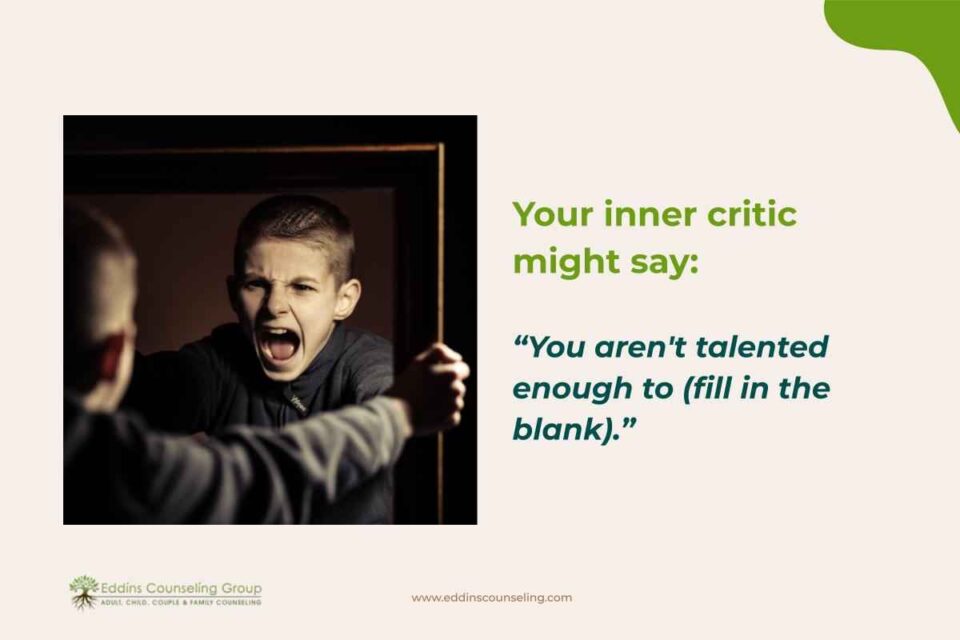
So maybe you’ve decided you want to go to grad school, or some lofty university and your inner criticism says: “Who do you think you are?”
Maybe you want some position at work and your inner criticism says: “Who do you think you are? You’re not capable of that.”
Or “You’ll never get that position, you’ll never get that raise.” And, you’re an idiot, you always do this, and you always apply for things that you’re incapable of.
You aren’t good enough to …. (fill in the blank.)
- You aren’t good enough to apply for that university,
- You aren’t good enough to get that raise,
- You aren’t good enough to try out for the drill team,
- You aren’t good enough to be a cheerleader,
- You aren’t good enough to be accepted,
- You aren’t good enough to be in a relationship
Just all that negative talk that our inner critic does.
Another example is: “You know they’re going to find out you are a fraud”. And we call this the imposter syndrome. We see this with therapists, we see it with teachers, we see it with CEOs, we see it with managers.
Because our inner critic has undermined our qualities and our strengths, we begin to doubt our own capabilities.
Or maybe as a child, you hear you’re lazy and so that voice continues to resonate with you. You oversleep one day and you’re late for work and all of a sudden you hear your inner critic saying: “You’re lazy, you’re never going to get a promotion, you’re going to lose your job.” So all these things are very negative that your inner critic is saying to you.
Here we have this young woman, maybe she’s in a conference, maybe she’s a speaker with her colleagues and she’s saying: “Who am I to think I belong with this talented group of people? I don’t belong here. My colleagues are going to recognize I am out of my league.”
This is again, the imposter syndrome. All of these voices start in our childhood.
Inner Critic & Anxiety
- There are many studies on the links between anxiety and strong inner critic:
- Has power to make us feel constantly anxious – hyper-vigilant
- May constantly point out danger to our physical and mental health
- May involve catastrophic thinking, exaggeration, emphasizing the bad and minimizing the good
- Drives us to want to take premature action to calm our anxiety
- Can engage in paranoid mind reading – attributing negative thoughts and actions to others
- Live in constant expectation of punishment, loss of love, abandonment in relationships
- Relentless focus on what if’s, what could go wrong
There are many, many studies on the link between anxiety and this strong inner critic that we have. The inner critic has the power to make us feel constantly anxious.
That hypervigilance that occurs, that fight, flight, or freeze mode can constantly point out danger to our physical and mental health.
So your inner critic may be saying: “Shouldn’t do this because this is going to happen.”
Not looking at all the possibilities that could happen but stating this is going to happen. This is going to happen to your physical health. This is going to happen to your mental health.
Constantly looking at the negative, not looking at all the possibilities and the positives that can happen. It may involve catastrophic thinking. Thinking of what’s the worst that could happen. Our anxiety will drive that and it will partner with our inner critic.
The exaggeration, like thinking it’s the worst day ever. It’s always emphasizing the bad and minimizing the good. So let’s say you get a promotion at work, but you don’t get the raise that goes with it.
Your inner critic will drive home that you did not get the raise, you only got the position. So the position may have been something really wonderful, and highly esteemed within your work, and you’re focusing on minimizing the importance and value of that and focusing on the salary.
Our anxiety and our inner critic also drive us to one to take premature action to calm ourselves.
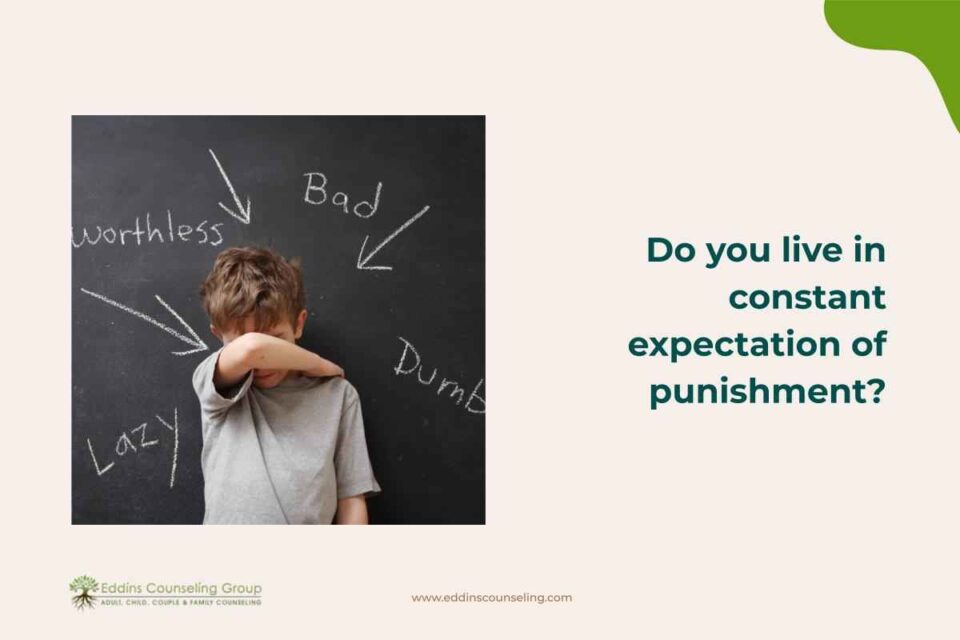
Our anxiety will tell us that something has to be taken care of right now, this minute. Instead of taking a breath and realizing that your anxiety is just speaking to you. You need to become calm, relax, and allow yourself to not partner and believe that you have to take care of this minute.
You can also engage in paranoid mind reading. So what happens is we believe that negative thoughts and actions of others are equal to how we view ourselves and how our inner critic views us. So we have to be careful that we’re not making assumptions that other people are having those same feelings and they’re attributing these negative thoughts to us.
The other thing is that we want to live in constant expectation of punishment. We’re waiting for that shoot drop, we’re waiting for that breakup. We’re waiting for the loss of love, we’re waiting for abandonment. And so we’re constantly expecting some kind of loss or punishment, some type of abandonment.
Then we have this relentless focus on the “what ifs”. What could go wrong? Instead of thinking of what can go right, and what are the good things that could happen, we have this tunnel vision into the negative.
Identify the Inner Critic
So we want to identify our inner critic. The first thing we want to do when we’re identifying our inner critic is to be curious about ourselves. It’s always great to be curious about other than it’s equally wonderful to be curious about ourselves.
- Be curious:
- What parts of yourself/life are you most critical of?
- How does the criticism manifest?
- Do you try to understand your limitations?
- What does it feel like to be self-critical?
- What type of language do you use?
- What is the tone?
- Do you feel motivated or self-defeated?
- Would you allow others to speak this way to you?
- What would you say to someone who speaks to you that way?
- Does your critic have a familiar voice?
Me, growing up in a home where my mom was a perfectionist, I often hear her voice when my inner critic is speaking to me. My mom had many wonderful qualities, but very high expectations and high criticism. And so this often will show up less frequently now, but certainly, through my young adulthood, early adulthood, occasionally even now, I recognize her voice.
Whose voice do you hear?
- Maybe a coach,
- maybe a teacher,
- maybe a parent,
- a grandparent?
But knowing, where did this resonate? Whose voice am I hearing? Or maybe you’re hearing your own.
So all of these things are really important when you’re asking: Who is your inner critic? These questions are very relevant and will help you be able to identify your inner critic.
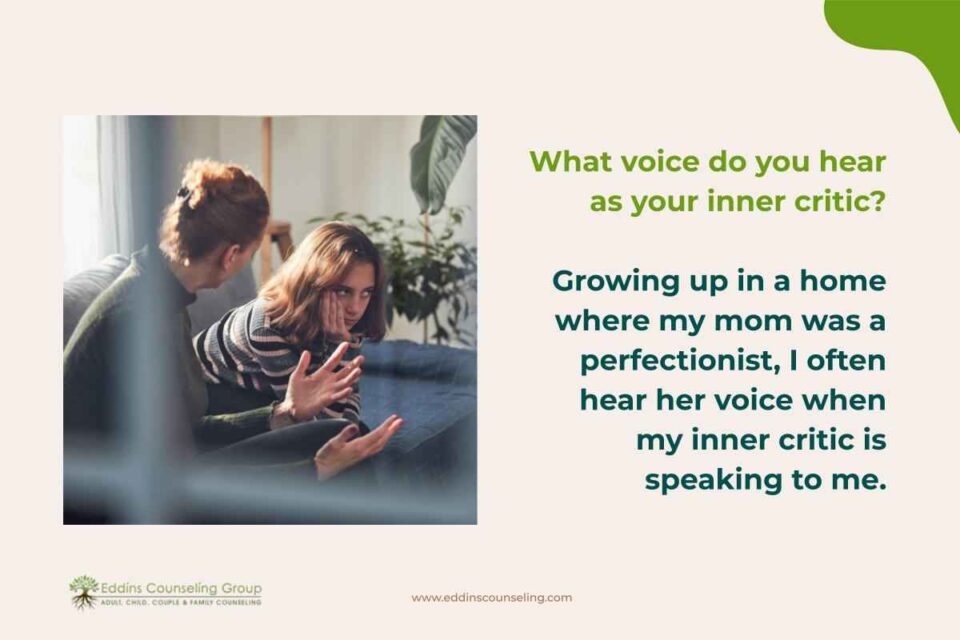
Talk to Your Inner Critic
- Once you recognize the voice of the inner critic and self-criticism:
- Pause and take 3 cleansing breaths
- Notice what you say to yourself when you fail or make a mistake
- Are there key phrases
- What is the tone of your voice
- Identify how you are partnering/agreeing with the judger/saboteur
Once you recognize the voice of the inner critic and your self-criticism, just pause. When your inner critic is talking to you, whether you’re at work or home or playing with friends, just pause. I hear you.
Take three deep, cleansing breaths, like you’re practicing mindfulness or you’re practicing yoga.
Just take that time, take that pause, and acknowledge: “I hear you. I’m going to breathe through this.” And then notice what you say to yourself when you fail or make a mistake.
Are there key phrases? Are you using these:
- Always,
- never,
- you’ll never be enough,
- you’ll never achieve,
- you’ll never be successful,
- you’ll never get in that program that you want to,
- you won’t be the CEO,
- you won’t be a manager,
- you’re lazy,
- you’re stupid,
- you’re an idiot
What are the phrases, and are they repetitive? They show up in those times when you are failing or making a mistake.
And again, what is the tone of your voice? Is it:
- Harsh,
- angry,
- sarcastic,
- condescending,
- pleasant,
- cheerful,
- happy, or
- encouraging?
What’s the voice? What’s the tone that you hear?
Identify how you are partnering or agreeing with the judge, or the saboteur.
Greta’s Personal Example – The Math Grade

When I was probably eight, I came home from school and my father was a big proponent of good grades and grades meant a lot to him. So I came home and I had a B in math.
And he was like: “Is this the best you can do?” He was questioning me, and not being extremely harsh, but firm. And my mom jumped in, wanting to rescue me in some way. She was like: “Oh, she’s just not good at math.”
So I started to internalize that, and I went into fourth and fifth grade and I really struggled with math. Even through junior high and high school. I think my first good experience with math, was when I was an undergrad, and I had an A in algebra. And I was like: “Whoa, maybe I’m not as bad at math as I thought.”
But I partnered through all those years. I would tell myself whenever I had a math class, that I’m just not good at math. And so my inner critic would tell me that in a loud voice, and I would also partner with that.
So identifying with how you’re partnering and agreeing with this judger, this saboteur, this critic, and how it’s holding you back.
I had an experience as an undergrad psychology major and statistics. And I kept having this battle with my inner critics thinking I’m not going to be able to do it. I’m not going to be able to get my degree in psychology. And I’m going to have to figure out another major. I’m not going to be able to go to grad school.
This is catastrophic thinking I’m partnering with. I’m believing my inner critic that I’m not going to be able to do this.
And I knew I had to pass statistics in order to get a degree in psychology. So recognizing how all those years of listening to my inner critic, believing him, and I ended up passing statistics, I got a degree in psychology. And it was a battle. I was constantly battling, and fighting it out.
So again, where are you agreeing with your inner critic? Thinking that you are something that you’re not or you’re not capable of something that you really are?
Take Action
- Think about what you would say to someone you love/care about
- Pay attention to your tone – how would you like to talk to yourself
- Practice using a kind/loving voice
- Identify what you are criticizing yourself for
- Take a learning stance – what can I learn from my inner voice
- How can I use the inner critic’s feedback as a motivator or in a constructive way
- How can I talk to myself like I would a child who is learning for the first time
We always want to take action.
Think about what you would say to someone you love or care about. Pay attention to your tone. How would you like to talk to yourself? Practice using a kind, loving tone, because there’s an element of what our inner critic says that is true, but it’s not the absolute truth. And so we want to use a kind, loving tone when we’re with ourselves. Identify what you’re criticizing yourself for.
Take a learning stance. What can I learn from my inner voice? What is the truth?
Like, for example, I wasn’t great at math. There was an element of truth to that, but it wasn’t that I couldn’t do it. So what can you learn? What can you learn from your inner voice where you can accept certain parts of yourself that are true but not take them to the extreme?
What part of your inner voice can you listen to? Can you trust? How can I use my inner critic’s feedback as a motivator? Because my inner critic was saying:
- You’re not good at math.
- You’re not going to be able to go to grad school.
- You’re not going to get a degree in psychology.
What my inner critic said is: “It’s not impossible. You are capable. You’re going to have to work hard.”
And that’s much more motivating than: “You can’t do this. You’re not good. It’s never going to happen.”

So how can you use that feedback as a motivation?
How can I talk to myself like I would a child who’s learning for the first time? So I think about bike riding. Your child or you are a child and you’re learning to ride a bike. You get on the bike. You’re not just going to jump on the pedal and go.
Probably the first few times teaching your child to ride a bike, they fall down, do you scream and yell at them and tell them they’re never going to be able to ride a bike, or they’re never going to be good enough to ride a bike? No!
You’re gentle and you’re loving and you say: “Sweetheart, it’s okay. Dust yourself off. Let’s go for this again”.
How can you approach yourself in the very same way like you would your child? Like you would your inner child?
Self-Compassion
I am a lover of Dr. Kristin Neff. I have a list of professors that I love, and she is one of them. She is at the University of Texas in Austin, and all of her research on self-compassion is empirical and evidence-based.
If you’re not familiar with her, and you really struggle with showing self-compassion, take a look at her work. It’s very meaningful. It’s been very impactful in my own life. So she says:
Unlike self-criticism, which asks if you’re good enough, self-compassion asks, what’s good for you?
What is Self-Compassion?
- Positive attitude we can have toward ourselves
- Empirically measured construct
- Composed of self-kindness, common humanity, and mindfulness
- Relating to yourself in a way that is accepting, forgiving, and loving
Self-compassion is the positive attitude that we can have toward ourselves.
It’s an empirically measured construct. It’s composed of self-kindness, common humanity, and mindfulness. And it’s relating to ourselves in a way that is accepting, forgiving, and loving.
This includes accepting our flaws, forgiving ourselves for our mistakes and loving ourselves unconditionally.
Self-Kindness
- Showing kindness and understanding when we fail at something
- Recognizing the influence of self-judgment
- Treating ourselves with warmth and patience
- Treating our worth as unconditional even when we don’t meet our own expectations
- Being tolerant of your shortcomings
- Being patient with your perceived flaws and shortcomings
Self-kindness is one of the components of self-compassion. Showing understanding and kindness when we fail at something. We’re not going to do well at everything. It’s impossible. We’re not made that way. We have our strengths, we have our weaknesses.
Understanding and being kind when those things happen, or even something that we’re good at. Being understanding if we don’t show up our best. Recognizing the influence of self-judgment and the negative way that it can impact us.
Treating ourselves with warmth and patience. Treating ourselves with that warmth, and patience that we would a child. And treating our worth as unconditional. I’m worthy regardless (even when we don’t meet our own expectations, much less the expectations of others). My worth is not based on my performance.
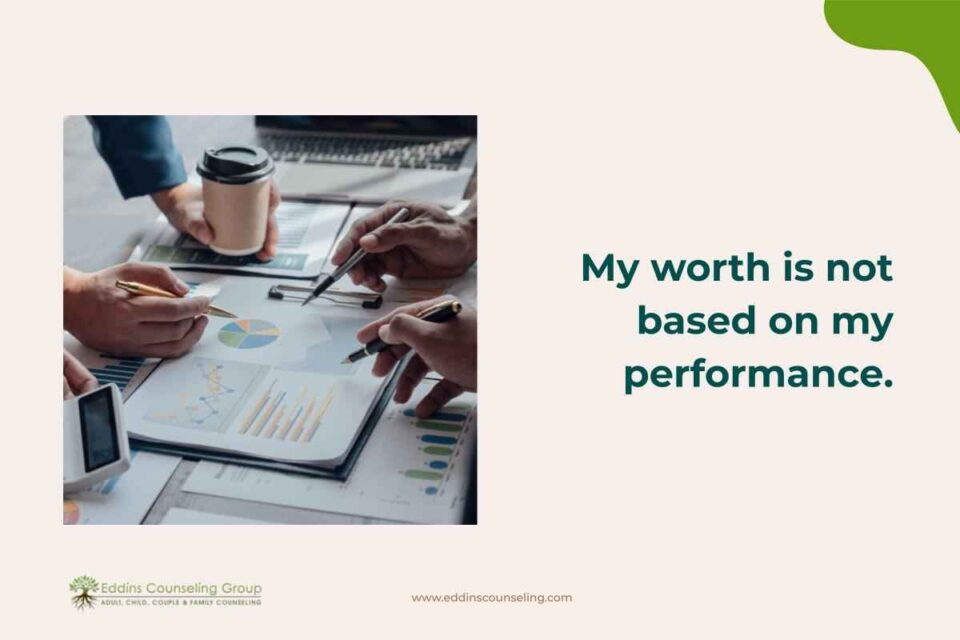
Being tolerant of your shortcomings. I have a list of shortcomings and I always will. They will be there.
Maybe the list might get shorter, might get longer. But really being tolerant of those and recognizing that that’s part of the human condition. Being patient with my perceived flaws and shortcomings, knowing that they’re there.
Some of them are my own perception. If I polled other people, they might say, no, I don’t agree with that at all. You are good at this. Or I don’t perceive that as being a flaw or a shortcoming.
Common Humanity
- Recognizing you are part of something bigger
- Viewing our own experience as being embedded in the broader human experience vs isolation and loneliness
- Accepting and forgiving our flaws
- Realizing we are not alone in our feelings of inadequacy or being imperfect
- Viewing your difficulties as something everyone goes through
Recognizing that we are all part of something bigger. Viewing our own experience as being embedded in the broader human experience versus isolation and loneliness.
This lack of self-compassion and this strong inner critic can lead to perfectionism and, as I address, probably one of my greatest struggles through most of my life along with people pleasing. And then it leads to shame.
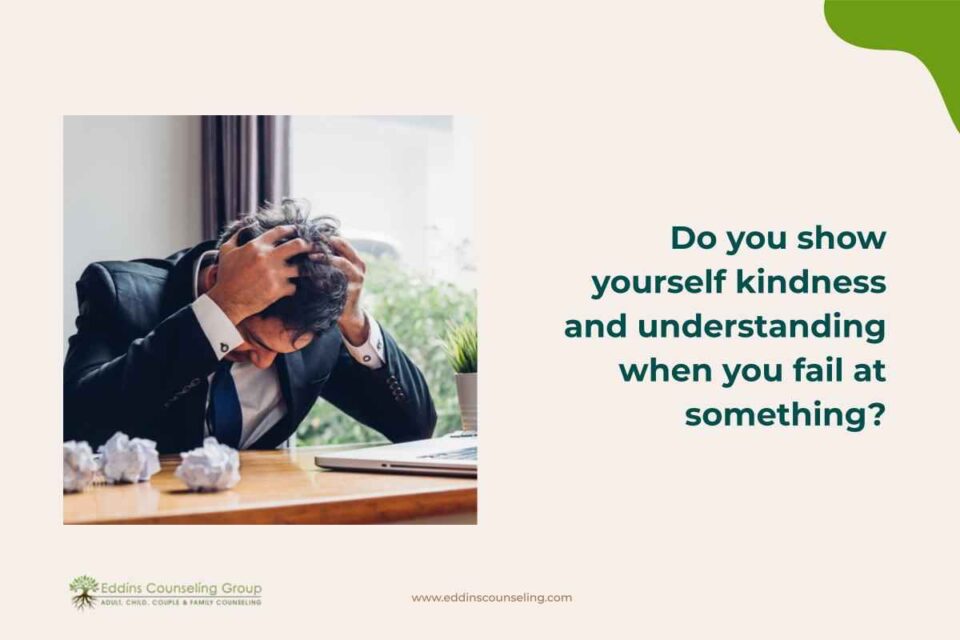
What happens in that shame and perfectionism is we isolate, we avoid, we don’t reach out, and we find ourselves not in a relationship.
If you’re familiar with Dr. Brene Brown, I encourage you to take a look at her work on perfectionism, vulnerability, and shame.
That shame that comes from partnering with our strong inner critic leads us to isolate and be alone and not realize that every person is struggling in some way.
We all have an inner critic accepting and forgiving our flaws. Realizing that we’re not alone in our feelings of inadequacy or imperfect. Each of us individually struggles with that, combats that, or fights that.
And viewing your difficulties is something that everyone goes through. Their difficulty may look somewhat different than yours, but in a place of our common experience, we each have difficulties. Recognizing that we all are there.
Mindfulness
- Acknowledging and labeling our thoughts vs reacting to them
- Opposite vs Avoidance
- Keeping our feelings in balance
- Maintaining perspective
- Looking at our emotions with curiosity and openness
Acknowledging and labeling our thoughts versus reacting to them. I teach a DBT group and in that group, we talk a lot about our thoughts.
In the mindfulness practice of meditation and mindfulness, we often just address that our thoughts are just thoughts. We don’t have to do anything to them. They are just thoughts. I don’t have to react to them, I don’t have to take care of them. I can let them float by and just go on a conveyor belt. Whatever visual you can come up with that is helpful for you.
Mindfulness is also the opposite of avoidance. If I’m being mindful, I’m leaning in and I’m being present. I’m also keeping my feelings in balance.
So again, when we look at DBT skills and the work of mindfulness in our lives, feelings aren’t facts.
So I remind myself: these are just feelings. My feelings are valid, and they’re important, but I need to balance those and recognize that they’re not factual enough to act out on them because I have correlated them to some fact.
I also need to maintain my perspective in this place of mindfulness and then look at my emotions with curiosity and openness, embracing my emotions, trying to understand why I’m having the emotions that I am, what’s driving that, and what do I need.
Tips for Practicing Self-Compassion
- Treat yourself as you would a friend
- Become more self-aware/curious
- Gain perspective – talk to others about their experiences with the inner critic
- Write a letter to your inner critic
- Practice mindfulness – use apps such as CALM, HEADSPACE, or 10% HAPPIER
- Use positive affirmations – speak and write them
- Keep a daily journal processing difficult events through a lens of compassion
You want to treat yourself as you would a friend. Would you want your friend to tolerate someone talking to them negatively like your inner critic does to you? Again, that curiosity. Become more self-aware of yourself and your emotions.
Gain perspective. Talk to other people about their own experiences with their inner critic, where they’ve been successful, where they’ve battled, and what they still struggle with.
You can write a letter to your inner critic and thank your inner critic for wanting to protect you, wanting to take care of you, but also let your inner critic know that you’re not going to tolerate the way that he or she addresses you anymore.
That you’ve had it like you’ve had enough. That you deserve compassion and empathy and kindness and kind words.
It can be really helpful to do that letter-writing experience, especially if you’re struggling with this harsh inner critic that’s creating anxiety and despair and really debilitating you in some way, preventing you from living the life that you really want.
Practice mindfulness!
There are some great apps such as Calm, Headspace, 10% Happier, and many, many more. In so many ways to bring mindfulness into your life.
Use positive affirmations. Write them down. You can write them in your mirror, or get up in the morning when you are getting ready for work, or school. See them, write them.
If you can’t find anything good about yourself, ask your friends, ask your partner, or ask your spouse. Speak them, put them on a sticky note. Stick them on your car. When you drive to work, you can repeat them.
It’s a great way to practice self-compassion, and see the best in yourself.
Keeping a daily journal. Again, I’m a huge fan of many of the professors at the University of Texas, including Dr. Kenneth Becker in the psychology department. He has spent his life doing research on journaling.
I’m a firm believer that it’s very impactful in our lives, and very helpful. I think it’s great when we’re trying to practice self-compassion and also when we’re struggling with difficult things.
So keeping this journal of difficult events that come up and how your inner critic may be sabotaging you and help you to look at those difficult events and process them through this lens of compassion and empathy.
Q & A
“I’ve been taught in leadership seminars that one can assume one is at cause for what happens in the outside world and thereby change one’s own behavior for the better to get better results. I raised the point that it could lead to us feeling as if we are to blame for everything bad that happens. How do you reconcile these state affairs?”
We can, as children, feel that we are to blame for everything that’s happened. That our parents, caregivers, teachers, professors, or coaches were to blame for their disapproval. And yes, then we begin to internalize that. That becomes a strong inner critic and we have to just recognize the truth.
I can feel that I’m responsible, but where are the facts? I can have these thoughts that I’m responsible for, but those are only thoughts. And so I think again, to look at your life, to look at your responsibility, because there are things we’re responsible for, but there are many things that we aren’t responsible for.
So recognizing that we can look at our lives and address the places that we are responsible for and also show compassion to ourselves for those places. But also identify that we are responsible for others and their actions.
Why is it that your critic, like a parent, etc, could tell you 1000 good things you did, but you internalize the one critical thing or the thing that you may have overheard them saying to someone else means so much more than what they said to your face?
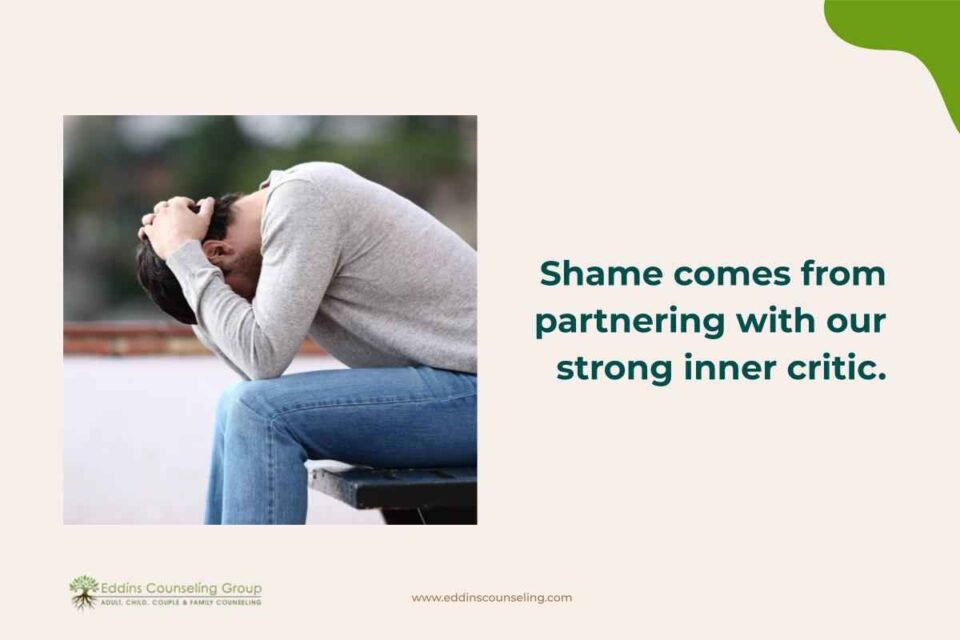
Why do we only hear that negative? Let me quote Dr. Judith Stern on this: “Genetics load the gun and the environment pulls the trigger”. And so quite possibly, maybe you’re just that child who came here more sensitive. So you internalize the negative things that were being said and maybe those began to become a bigger part of your life.
So your inner critic then is telling you to focus on the negative things that your parents have said instead of taking the good things that they’ve said and focusing on those. I think that that is often what happens.
We hear the negative, our inner critic attaches to it and so you’re hearing that repeatedly. And when your parents say: “Great job, good grades, well done,” you overlooked that because you’ve now partnered with your inner critic.
You’re in this catastrophic thinking. You’re in a place where you are believing the negative things. So how can you shut that inner critic down and begin to hear the positives? Not only what your parents are saying about you, but the positive that others.
How do you deal with the same family who reinforces your inner critic? I tend to isolate myself from them and then feel guilty.
That experience is where we want to hide. The isolation that comes when our inner critic is so strong, and instead of wanting to show up and realize that this is all part of the common human experience. There are a lot of ways that I could approach that. We have family dynamics.
Oftentimes as adults, we can gather with our family members, and we can all of a sudden feel like we’re a child again. We’re arguing with our siblings. We’re vying for parental attention.
So recognizing again where your inner critics started, how it may show up as that parent, that family member, and again, doing that individual work that is required of us to recognize our inner critic and also shutting that inner critic down. Self-compassion, recognizing that we’re all part of this common humanity doing mindfulness, and oftentimes addressing those family members.
I think when we’re doing our own inner critic work, we’re less inclined. Not that it won’t ever happen, but as we begin that inner critic work, we’re able to tolerate maybe the way that person is showing up and aligning with our inner critic. I hope that makes sense and is helpful.
How do you tell the difference between the inner critic and a very real need for self-improvement? How to identify what might really need to change?
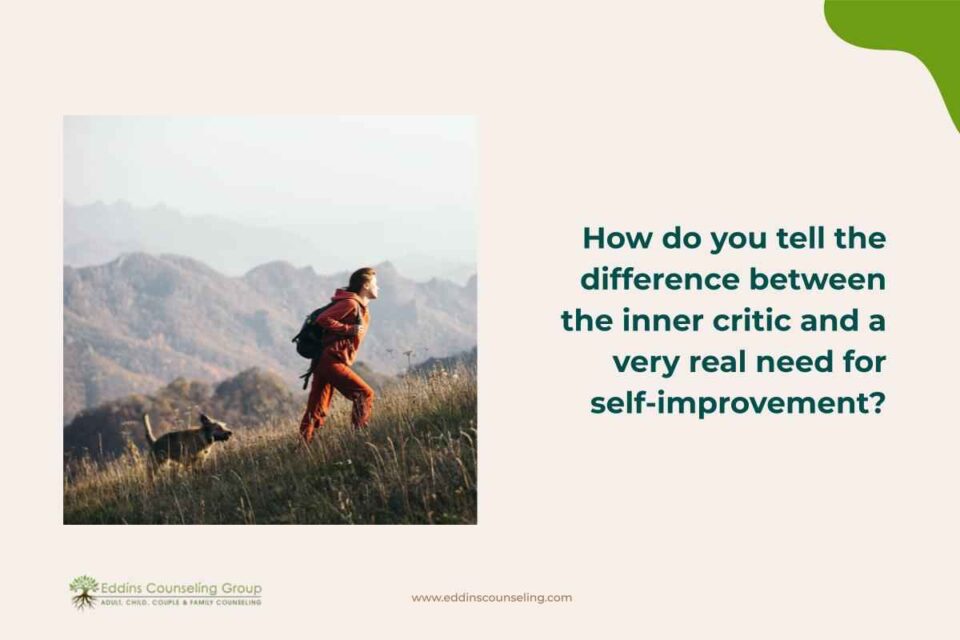
There’s probably in many areas of our lives, room for improvement. I think, asking myself: “How am I talking to myself about this? Is my inner critic addressing my need for self-improvement that’s motivating and not talking to me in this harsh, awful voice?”
I think that’s when we can begin to note that there’s a need for self-improvement. It’s like “my inner critic is talking to me in this kind, loving voice” and I’m recognizing that this is a need for self-improvement. It’s my inner critic talking to me in this harsh way that I just feel demotivated and disempowered and so try to change the way that my inner critic is talking to you. Begin to talk to yourself in this loving way and see if those areas of self-improvement feel like they’re important and valuable and will improve your life.
What is it like to work with individuals with strong religious backgrounds who attribute their inner critic, at least partially, to negative spiritual forces? How do you integrate psychological concepts with their worldview?
That is a great question, one that I don’t feel completely qualified to answer. As social workers, meeting our clients where we are is very important. Addressing their views and helping them to also see what else might be at play. How family members, how experiences in school and all the things we talked about earlier in the presentation could also be contributing to this strong, harsh inner critic. That it might not just be a religious and there can also be critical caregivers in the religious community.
So just helping them see outside of that, like taking them to the work of combating their inner critic, recognizing it. Also taking them to Kristen Neff’s work and helping them to see that it could be some religious spirit or some spiritual force, but it can also be these other things and helping them see that it’s just not one or the other, all or nothing. That it could be this combination.
I realized that my siblings’ voices reinforces my inner critic for me as an outer critic. So avoidance is my current approach. Any suggestions?
As we’ve discussed, hopefully, I’ve presented in a way that you can understand that this is our go-to. When we have a strong, harsh inner critic that results in high anxiety and shame. Shame keeps us from wanting to connect.
As I do this inner critic work, I begin to recognize that it is my siblings’ voices that I hear. And how can I, as I’m doing the inner critic work and showing up more compassionate, more empathic with myself, lean into the relationship?
I would suggest that if you’re not in some kind of individual therapy, maybe find a therapist here in the Houston area, such as myself or other therapists that we have who are completely qualified to do this work with you.
Again, this is a very individual question. I think the base of the answer is to begin to do the work on recognizing where this started, how you partner with it, how you’re allowing it to be debilitating in your life, and how it’s creating more isolation for you.
And then depending on the relationship that you have with your sibling, maybe have a conversation about the inner critic, about what you’re learning.
Brené Brown
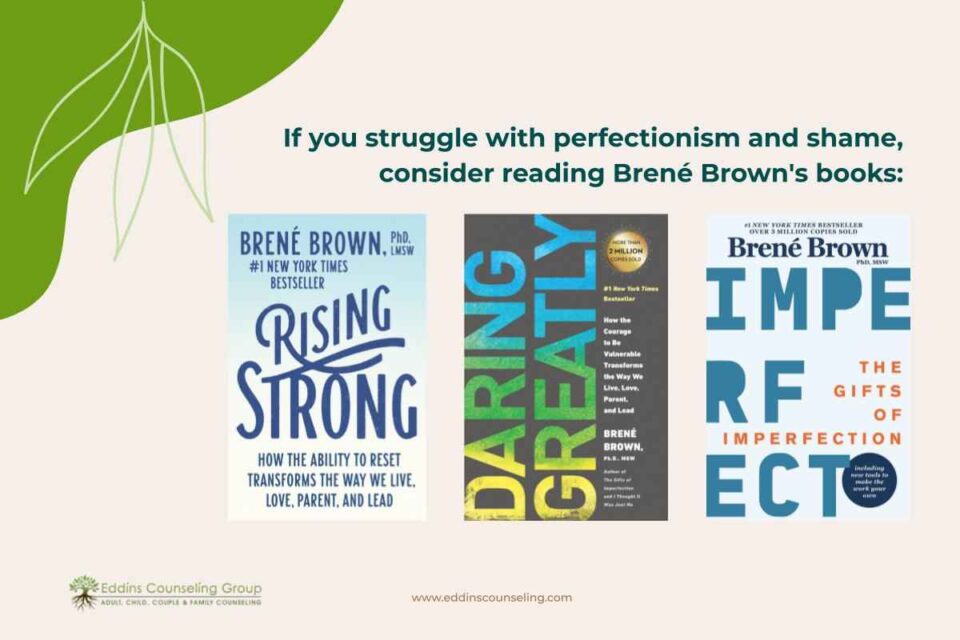
About Brené Brown. Google her Ted Talk on vulnerability. It’s amazing. It’s like 10 or 11 years old. I reference a lot of her work. She also has a Netflix program, Brené Brown: The Call to Courage. I think it came out last year, and it’s kind of a compilation of all of her work.
If you struggle with perfectionism, and shame, I think her work will really resonate with you. She has some great books, such as “Rising Strong”, “Daring Greatly”, and “The Gifts of Imperfection”. “The Gifts of Imperfection” personally changed my life. I’ve read it several times.
I would highly recommend Brené Brown if you struggle in this place of shame and lack of vulnerability, that you definitely access her work.
EMDR and the inner critic
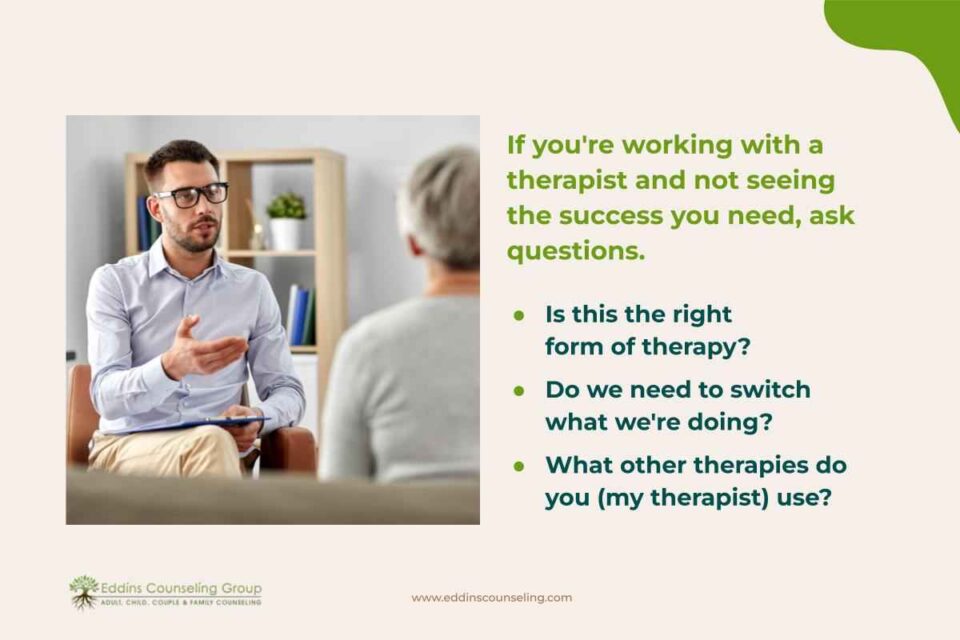
I’m not an EMDR therapist, but definitely I believe that an EMDR therapist could work with you on the inner critic. And so I would ask, if you have an EMDR therapist, just bring us to their attention and ask them how they see the work of EMDR partnering in your work on the inner critic.
At what point would you conclude that these approaches are just not working and you need another form of therapy like EMDR or related therapies?
If you’re working with the therapist and you’re not seeing the success you need, you can ask lots of questions such as:
- Is this not the right form of therapy?
- Am I using CBT or DBT or what form of therapy is my therapist using?
- Do we need to switch what we’re doing?
- Do we need to go to EMDR?
- What other therapies does my therapist use?
- If we’re not doing (XX type of therapy), what would my therapist recommend?
Have an honest, open conversation with your therapist.
I always welcome that in my own work. If my clients feel that we’re not making headway, what can we change?
It’s a great opportunity as a therapist for me to learn and grow and also from my clients to get what they need, which is ultimately the most important thing.
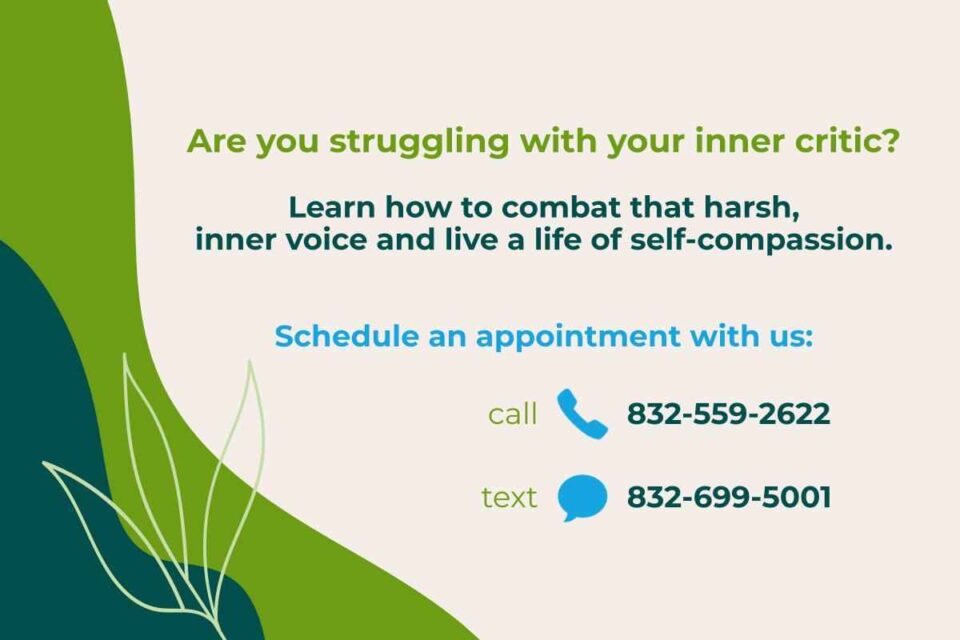
So I would encourage you to have those kinds of conversations and also identify what the barriers are to maybe you moving forward. Is it your own work that you’re resisting, or is it truly just this type of therapy that you don’t need?
So, again, thank you all so much for attending. I really enjoy talking to each of you. I wish that we had been able to meet in person.
Why You Feel This Way
Get instant access to your free ebook.
Grounding & Self Soothing
Get instant access to your free ebook.
7 Mood-Boosting Tips
Get instant access to your free ebook.


